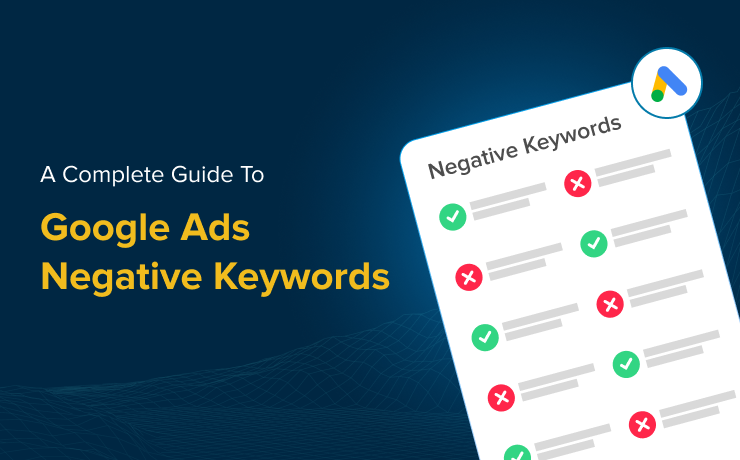
Paid search campaigns attract potential customers. However, not all clicks bring value. Businesses often waste budgets on irrelevant searches that do not lead to conversions. Google Ads negative keywords help eliminate unnecessary spending by filtering out unqualified traffic. They improve click-through rates, ad relevance, and return on investment when used correctly.
Instead of competing for searches that do not match business goals, advertisers can focus on high-value prospects. Understanding how negative keywords work allows businesses to refine targeting, create more relevant ads, and increase conversions.
What Are Google Ads Negative Keywords?
Negative keywords prevent ads from appearing for specific search terms. This filtering process helps businesses avoid paying for clicks that do not align with their services or products.
For example, a luxury watch brand may want to exclude searches for “cheap watches” to attract high-intent buyers.
Negative keywords can be applied at different levels within an account. Advertisers may block certain terms from entire campaigns or limit them to specific ad groups. Using the right negative keyword strategy reduces irrelevant impressions and improves ad performance.
Types Of Negative Keyword Match Types
Google Ads offers three types of negative keyword match types, with different functions. This allows advertisers to control how strictly search terms are filtered.
- Broad Match: Ads will not show if the search contains all words in any order. If “running shoes” is a negative broad match, an ad will not appear for “blue shoes for running.” However, it may still appear for “best athletic shoes.”
- Phrase Match: Ads will not appear when the exact phrase is in the search. If “running shoes” is a negative phrase match, an ad will not show for “buy running shoes today.” Meanwhile, it may still appear for “best shoes for exercise.”
- Exact Match: Ads will not show for searches that match the exact negative keyword. If “running shoes” is a negative exact match, an ad will not display only for “running shoes.” On the other hand, it may still appear for “best running shoes for men.”
How Negative Keywords Improve Campaign Performance
Filtering out irrelevant traffic benefits both ad performance and budget allocation. Negative keywords help in several key areas:
- Higher Click-Through Rates (CTR): Ads appear only for relevant searches. This can lead to higher engagement from users genuinely interested in the offer.
- Better Ad Relevance: Refining search terms improves ad quality scores, which can lower costs and improve placement.
- Reduced Cost-Per-Click (CPC): Eliminating wasted clicks saves money and allows advertisers to reallocate budgets to better-performing keywords.
- Higher Conversion Rates: Removing low-intent traffic helps focus on users more likely to take action.
Finding and Adding Negative Keywords
Negative keywords should be selected based on search intent, industry relevance, and past campaign data. Businesses can identify unnecessary terms by reviewing search query reports in Google Ads. This report shows actual search terms that trigger ads and helps advertisers spot irrelevant searches.
Another way to build a negative keyword list is by brainstorming unrelated or misleading terms. For example, a plumbing company may want to exclude “DIY plumbing tips” or “plumbing jobs” to avoid searches that do not result in service calls.
Once identified, negative keywords can be added at the account, campaign, or ad group level in the Google Ads interface. Regularly updating these lists helps maintain ad efficiency.
Integrating Negative Keywords with Other Strategies
Negative keywords work best when combined with a comprehensive search strategy. Pairing them with well-structured ad groups, targeted bid strategies, and optimized landing pages leads to better results. Businesses looking for long-term organic traffic growth can also benefit from investing in organic SEO services to attract the right audience.
Refining Google Ads Campaigns with SmartSites
Using negative keywords in Google Ads improves ad targeting and reduces wasted spending. SmartSites optimizes campaigns to maximize conversions while minimizing costs. Our team refines keyword lists, improves ad relevance, and creates strategies that drive better results. Let us help you refine your digital marketing strategies. Contact us for more information.
 Free
Consultation
Free
Consultation Free
Google Ads Audit
Free
Google Ads Audit








